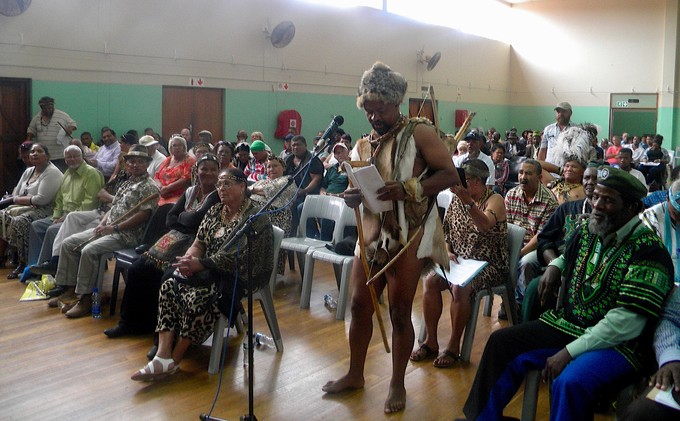
Chief Khoi-San Africa speaking at the public hearings in Port Elizabeth on the Traditional and Khoi-San Leadership Bill. Photo: Joseph Chirume
13 December 2016
At a public hearing on Friday in Port Elizabeth, Khoi-San people and traditional leaders voiced their doubts about the 96-page bill that has been tabled in Parliament to officially recognise and establish traditional Khoi-San leaders and structures.
Richard Ndakane, chairman of the parliamentary committee responsible for drafting the bill, addressed the packed Gelvandale community hall: “We are trying to accommodate the Khoi-San people by addressing what was created some 350 years ago … It is important to work together to resolve the problem because all of us were victims of land exploitation.”
Numerous people said they wanted more time to read and understand the bill. Others wanted it translated into their languages.
Chief Florence de Vos said, “We do appreciate the Bill, but it has come a little bit late. We are not satisfied with some aspects of it. The Premier of the Eastern Cape has too much power with regards to what is stated in the bill while the chiefs and kings have little say. As the Khoi-San we don’t have any funding from the government. There is a Khoi-San symbol on our national emblem but we are not recognized by the very same government.”
She said she and other chiefs would consult each other and make their own amendments to the bill which they would submit on 11 March 2017 in Kimberley at the final public hearing on the bill.
Community member, John Joseph said: “There is no one present in this hall from the municipality … Where is this bill taking us to? It started being drafted in 2010 and we are still holding public hearings … It’s long overdue.”
Activist Thabisa Mhlahlo said, “The bill is silent on rural areas and also says nothing about women. We know that the majority of the chiefs and kings live in rural areas and most of their subjects are women because men are often in urban areas working.The bill says nothing about this.”
Louisa Louis,a long time Khoi-San activist registered her disgruntlement over land ownership and chieftainship. She said, “According to the bill, we have to prove that we are true Khoi-San people in order to be recognized. The bill does not recognize our ancestors. The bill is surprisingly silent on issues concerning land compensation and ownership. I contend that it is not an honest legal framework. In June 1991, the term coloured was scrapped by the government but to my astonishment it is widely used for official identification purposes.”
Louis appealed to the Khoi-San chiefs to respect their people once elected into their positions. “Please don’t sell us out. Don’t accept bribes. Meet regularly with your people and respect their will. This is our land. We are the first nation so please recognize us, our culture and our language.”